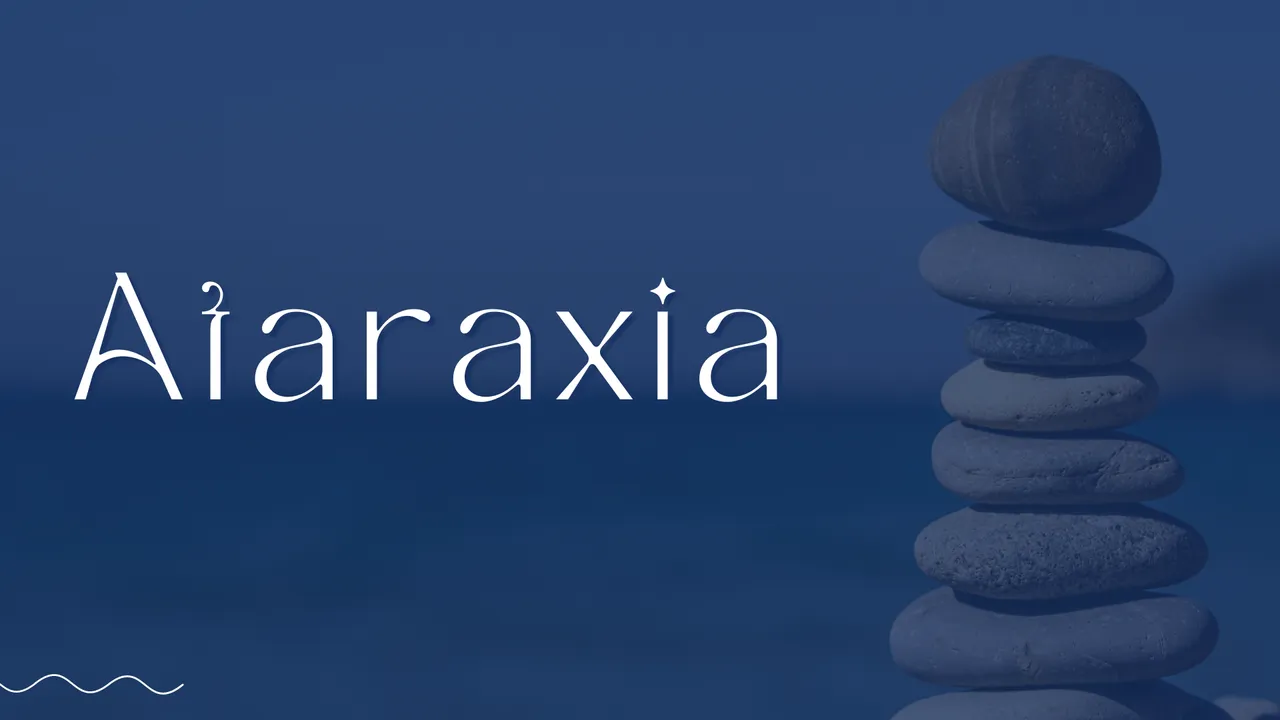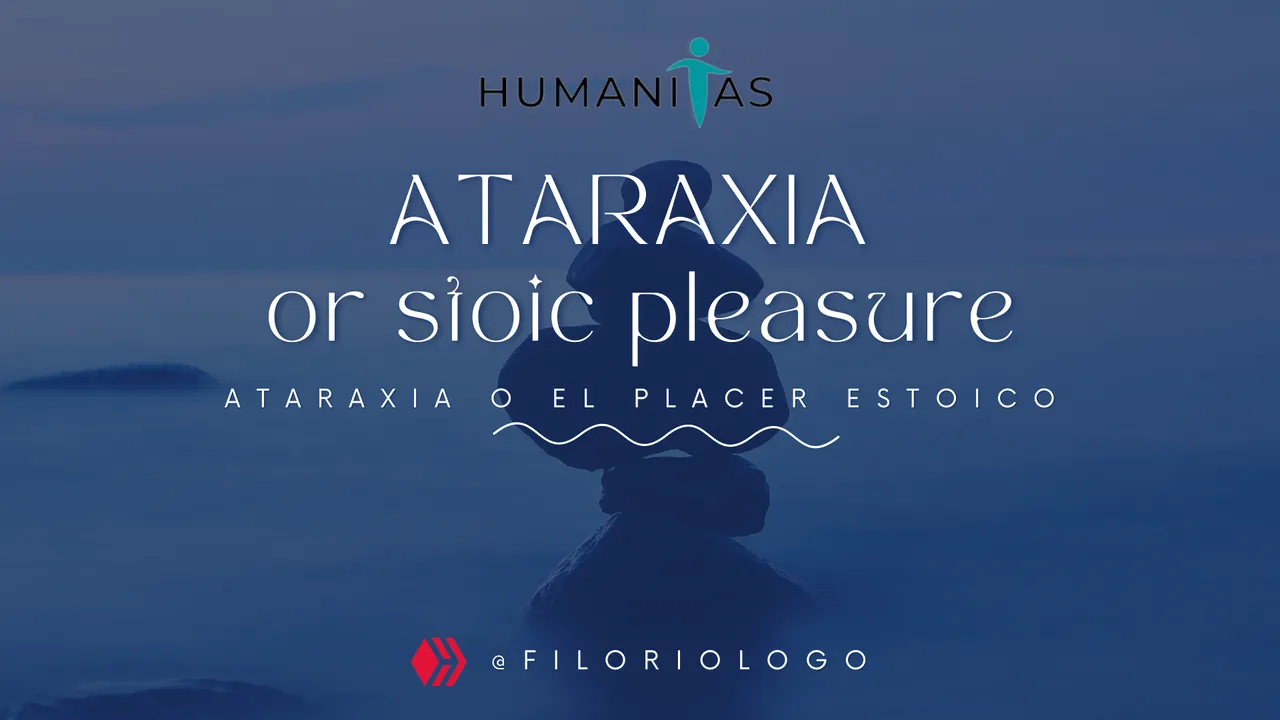De las filosofía helenísticas que más me ha llamado la atención en mi caminar por la filosofía ha sido el estoicismo, sin duda alguna manejan una visión del mundo que da mucho que pensar y reflexionar. Si miramos sus máximos exponentes encontramos una variedad de personajes llamativos, cada uno con su particularidad y que han aportado visiones e interpretaciones que han construido lo que es el estoicismo. Desde esclavos hasta emperadores romanos han vivido bajo la doctrina estoica, y hoy en pleno siglo XXI vuelve a estar muy de moda este modo de vivir. Quizá no hayamos cambiado mucho en esencia desde la antigüedad hasta nuestros días.

Pero, esto no se trata de hablar sobre la historia del estoicismo o de sus exponentes, sino que con este escrito pretendo esbozar de una jovial y fresca manera lo que es el placer estoico, o como ellos le llaman la “ataraxia”
Etimológicamente hablando la palabra ataraxia viene a significar algo como la ausencia de turbación, hoy podríamos llamarle tranquilidad de cuerpo, mente y alma. De hecho, de las cosas que más defiende un estoico es el autocontrol, poder conseguir la imperturbabilidad del alma, un estado donde podamos decir que vivimos en tranquilidad, donde nada nos saque de nuestra ecuanimidad emocional. Se dice muy fácil, pero, tanto tu estimado lector como yo, sabemos que eso no es tan fácil, en verdad, es de las cosas más complicadas.
Ahora bien, como el placer se vincula a la ataraxia estoica. No habría ningún problema con afirmar que el placer es esa experiencia que se siente bien, sentir algo como placentero implica el disfrute de aquello que se experimenta independientemente del modo de percibir la experiencia. En otras palabras, hay modos de experimentar lo placentero, podríamos dar cientos y cientos de ejemplos de cosas placenteras. Pero, podríamos preguntarnos de donde surge la palabra placer y porque lo relacionamos al goce y para mi, este es el punto verdaderamente crucial para entender la ataraxia estoica al placer.
Si indagamos en la etimología de la palabra placer de manera rápida nos llevara a la lengua latina, ya que placer proviene de “placere” que significa agradar, pero, esto no nos dice mucho así que indaguemos un poco más atrás, y busquemos una referencia aun más antigua, cosa que parece ubicarnos frente al indoeuropeo y poner en relación la palabra placer con la palabra “pla-k” que viene a significar: plano, y esta raíz la podemos observar en palabras como planicie o playa. Puedes indagar un poco más sobre la etimología en este Diccionario Etimológico.
Ahora bien, si placer proviene de lo que es plano según nos lo parece indicar el diccionario etimológico, me pregunto, ¿Acaso no es placentero para un navegante viajar con el mar en calma?, en realidad nunca he navegado, pero, imagino un mar en calma ayuda a que el viaje sea placentero. Justo en este punto quería llegar para entender porque en la sabiduría estoica impera la búsqueda de la imperturbabilidad del alma, esa especie de equilibrio emocional donde vivamos como en una especie de perpetua calma.

En realidad la ataraxia para los estoicos era un ejercicio activo de adecuar la vida, a la razón natural. Razón que nos dice según la interpretación estoica que debemos vivir conforme a la naturaleza, esto no significa vivir en un estado animal o de algún modo salvaje, sino entender, que lo propio del ser humano es poder tener la capacidad de discernir, de comprender que hay cosas que podemos controlar y otras que no. Y aquí radica el principio activo de la ataraxia.
Un estoico no es un ser que viva en la ausencia de emociones, sino que las entiende, y sabe que son decisiones que parten de los estímulos, estímulos que podemos o no controlar. Y el placer, para el estoico es vivir en ataraxia, en plenitud, en una vida que sopese cada evento de manera que nada pueda sacarlo de la imperturbabilidad que persigue. En resumen, un estado de calma, de inmutabilidad emocional es algo placentero, una especie de tranquilidad, de planicie emocional.
He escrito este pequeño articulo para participar en la dinámica semanal de la comunidad, que se nos invita a través de esta iniciativa a disertar sobre el placer y lo humano.

ENGLISH
ATARAXIA or stoic pleasure
Of the Hellenistic philosophies that have most caught my attention in my journey through philosophy has been Stoicism, undoubtedly they handle a worldview that gives much food for thought and reflection. If we look at its greatest exponents we find a variety of striking characters, each with their own particularity and who have contributed visions and interpretations that have built what Stoicism is. From slaves to Roman emperors have lived under the Stoic doctrine, and today, in the XXI century, this way of living is once again very fashionable. Perhaps we have not changed much in essence from antiquity to the present day.

But, this is not about talking about the history of Stoicism or its exponents, but with this writing I intend to outline in a jovial and fresh way what is the Stoic pleasure, or as they call it the "ataraxia".
Etymologically speaking the word ataraxia comes to mean something like the absence of disturbance, today we could call it tranquility of body, mind and soul. In fact, one of the things that a stoic most defends is self-control, to be able to achieve the imperturbability of the soul, a state where we can say that we live in tranquility, where nothing takes us out of our emotional equanimity. It is said to be very easy, but, both you, dear reader, and I, know that it is not so easy, in fact, it is one of the most complicated things.
Now, since pleasure is linked to stoic ataraxia. There would be no problem with stating that pleasure is that experience that feels good, to feel something as pleasurable implies the enjoyment of that which is experienced regardless of the mode of perceiving the experience. In other words, there are ways of experiencing the pleasurable, we could give hundreds and hundreds of examples of pleasurable things. But, we could ask ourselves where the word pleasure comes from and why we relate it to jouissance and for me, this is the really crucial point to understand the stoic ataraxia to pleasure.
If we look into the etymology of the word pleasure, it will quickly take us to the Latin language, since pleasure comes from "placere" which means to please, but this does not tell us much so let's look a little further back, and look for an even older reference, which seems to place us in front of the Indo-European and relate the word pleasure with the word "pla-k" which comes to mean: flat, and this root can be seen in words like plain or beach. You can find out more about the etymology in this Etymological Dictionary.
Now, if pleasure comes from what is flat as the etymological dictionary seems to indicate, I wonder, isn't it pleasant for a sailor to travel with a calm sea, I have never actually sailed, but, I imagine a calm sea helps to make the trip pleasant. Just at this point I wanted to get to understand why in the stoic wisdom prevails the search for the imperturbability of the soul, that kind of emotional balance where we live in a kind of perpetual calm.

In reality the ataraxia for the Stoics was an active exercise of adapting life to the natural reason. Reason that tells us according to the stoic interpretation that we must live according to nature, this does not mean to live in an animal state or somehow wild, but to understand, that what is proper to the human being is to be able to have the ability to discern, to understand that there are things that we can control and others that we cannot. And here lies the active principle of ataraxia.
A stoic is not a being who lives in the absence of emotions, but who understands them, and knows that they are decisions based on stimuli, stimuli that we may or may not control. And pleasure, for the stoic is to live in ataraxia, in fullness, in a life that weighs each event so that nothing can take him out of the imperturbability he pursues. In short, a state of calm, of emotional immutability is something pleasant, a kind of tranquility, of emotional flatness.
I have written this small article to participate in the weekly dynamics of the community, which invites us through this initiative to discuss pleasure and the human.
Translated with DeepL.com(free version)

Otras|Other RRSS


